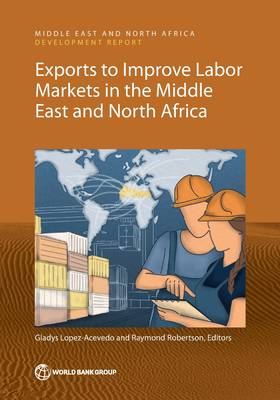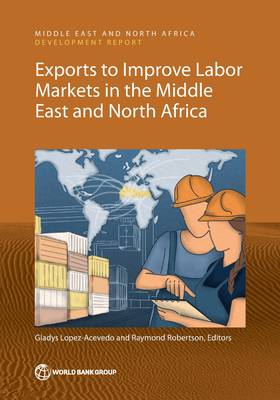
- Retrait gratuit dans votre magasin Club
- 7.000.000 titres dans notre catalogue
- Payer en toute sécurité
- Toujours un magasin près de chez vous
- Retrait gratuit dans votre magasin Club
- 7.000.0000 titres dans notre catalogue
- Payer en toute sécurité
- Toujours un magasin près de chez vous
Exports to Improve Labor Markets in the Middle East and North Africa
Gladys Lopez-Acevedo, Raymond RobertsonDescription
In the Middle East and North Africa (MENA), trade liberalization measures have coincided with stable economic growth, and GDP per capita growth has surpassed that of other developing regions. However, MENA's labor-market outcomes--such as average wage levels, informality rate, and female labor force participation--continue to underperform. Why has rising trade failed to produce better labor market outcomes in low- and middle-income countries in the region?
'Exports to Improve Labor Markets in the Middle East and North Africa' focuses on the impact of trade policy on trade-flows and their relationship with local labor market outcomes in three low- and middle-income countries--the Arab Republic of Egypt, Morocco, and Tunisia. Given their idiosyncratic labor markets, export diversification, and trade policy history, these three countries other important lessons for economic development in the region. Policy makers and stakeholders can use these findings to design policies to improve the chances that higher trade flows will deliver better labor market outcomes and ensure that the benefits are more equally shared.
'This report, led by Gladys Lopez-Acevedo and Raymond Robertson, pushes forward the frontier of knowledge about the relationship between trade and the labor market in MENA. Although focusing on three countries (the Arab Republic of Egypt, Morocco, and Tunisia), it gives us broader lessons on how to solve the apparent puzzle of greater exposure to trade not being followed by greater labor market outcomes in the region. It points out, among other factors, how market segmentation by gender shapes the effects of trade shocks like higher exports. Policy makers in the region will definitely benefit from the evidence and analysis conveyed by the report on how to turn trade integration into a lever for shared prosperity.'
--Otaviano Canuto, Senior Fellow at the Policy Center for the New South, and former Vice President of the World Bank
'This timely report attempts to understand why trade expansion did not produce the desired improvements in labor market outcomes in three non-oil-exporting countries in MENA. The main reason for the weak link between trade expansion and widely shared labor market improvements appears to be the segmented nature of labor markets in the three countries, by gender as well as by formality status. In Morocco and Tunisia, the highly segmented labor markets along gender lines, in combination with the concentration of trade in male-dominated capital-intensive sectors, led to few employment benefits accruing to women. In Egypt, the limited impact of trade on formal employment is attributable to the small size of the nation's export sector and its lack of integration with the rest of the economy. These findings are critical to understanding how barriers to widely shared prosperity can be tackled in the region.'
--Ragui Assaad, Professor, Humphrey School of Public Affairs, University of Minnesota
Spécifications
Parties prenantes
- Auteur(s) :
- Editeur:
Contenu
- Nombre de pages :
- 162
- Langue:
- Anglais
Caractéristiques
- EAN:
- 9781464819728
- Date de parution :
- 07-08-23
- Format:
- Livre broché
- Format numérique:
- Trade paperback (VS)
- Dimensions :
- 178 mm x 254 mm
- Poids :
- 462 g

Les avis
Nous publions uniquement les avis qui respectent les conditions requises. Consultez nos conditions pour les avis.






